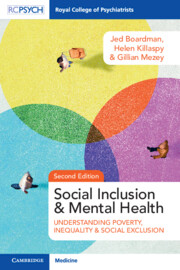Book contents
- Social Inclusion and Mental Health
- Reviews
- Social Inclusion and Mental Health
- Copyright page
- Contents
- Foreword to Second Edition
- Foreword to First Edition (2010)
- Preface
- Acknowledgements
- Chapter 1 Introduction: Poor, Excluded, and Unequal
- Section 1 Social Exclusion, Poverty, and Inequality
- Chapter 2 Social Exclusion: Basic Concepts
- Chapter 3 Social Exclusion: Applying the Paradigm to People with Mental Health Conditions – Key Aspects
- Chapter 4 Poverty and Deprivation: Getting Under the Skin
- Chapter 5 Poverty, Deprivation, and Social Exclusion in the United Kingdom
- Chapter 6 Poverty, Inequality, and Health
- Chapter 7 Social Policy, the Welfare State, and Social Exclusion
- Chapter 8 Mental Health Services and Policy in the United Kingdom
- Section 2 Participation of People with Mental Health Conditions
- Section 3 Including People
- Index
- References
Chapter 4 - Poverty and Deprivation: Getting Under the Skin
from Section 1 - Social Exclusion, Poverty, and Inequality
Published online by Cambridge University Press: 24 November 2022
- Social Inclusion and Mental Health
- Reviews
- Social Inclusion and Mental Health
- Copyright page
- Contents
- Foreword to Second Edition
- Foreword to First Edition (2010)
- Preface
- Acknowledgements
- Chapter 1 Introduction: Poor, Excluded, and Unequal
- Section 1 Social Exclusion, Poverty, and Inequality
- Chapter 2 Social Exclusion: Basic Concepts
- Chapter 3 Social Exclusion: Applying the Paradigm to People with Mental Health Conditions – Key Aspects
- Chapter 4 Poverty and Deprivation: Getting Under the Skin
- Chapter 5 Poverty, Deprivation, and Social Exclusion in the United Kingdom
- Chapter 6 Poverty, Inequality, and Health
- Chapter 7 Social Policy, the Welfare State, and Social Exclusion
- Chapter 8 Mental Health Services and Policy in the United Kingdom
- Section 2 Participation of People with Mental Health Conditions
- Section 3 Including People
- Index
- References
Summary
In this chapter we examine the historical background to poverty research, the definition and concepts of poverty, and how is it experienced by individuals, families, and communities. The focus is mainly on the UK and on qualitative studies. Poverty is a cause of human suffering and the experiences of people living in poverty are mediated by social divisions such as gender, ethnicity, and disability. It can be understood in terms of the need of material resources, but also in terms of its psychosocial effects. It has clear effects on mental and physical health. Many aspects of the lives of people in poverty parallel the position of people with mental health conditions: lack of agency, opportunity, and voice; living compromised lives with stigma and discrimination; and struggling with day-to-day functioning, employment, and housing. Poverty impacts negatively on self-esteem and produces feelings of shame and guilt in response to inadequate material and social situations. It is possible that some of the mechanisms for understanding mental ill-health may also be shared with those related to poverty.
Keywords
- Type
- Chapter
- Information
- Social Inclusion and Mental HealthUnderstanding Poverty, Inequality and Social Exclusion, pp. 57 - 86Publisher: Cambridge University PressPrint publication year: 2022

